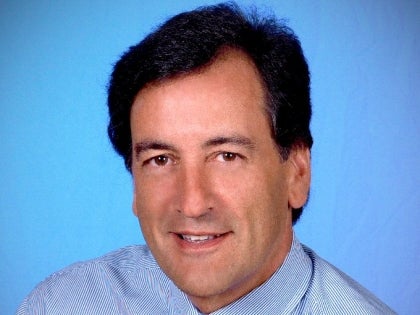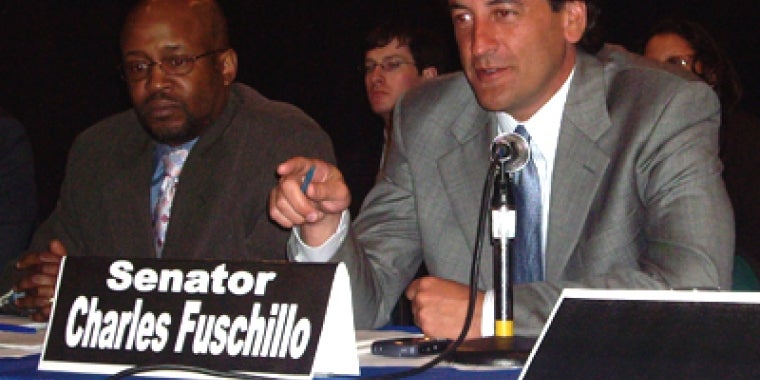
Senator Fuschillo: Hearing Exposes Abusive Credit Card Practices That Are Driving Up Debt For New York Consumers

State Senator Charles J. Fuschillo, Jr. (Merrick, 8th Senate District), chairman of the New York State Senate Committee on Consumer Protection, today conducted a public hearing on the abusive practices used by credit card companies that are driving up debt for New York consumers. Participants at the hearing, which took place at Hofstra University, examined the billing, marketing and disclosure practices of the credit card industry and their impact on New York consumers.
Senator Fuschillo was joined at the hearing by Senators Kemp Hannon (6th Senate District) and Carl Marcellino (5th Senate District), and Assemblymembers David G. McDonough (19th Assembly District) and Darryl Towns (54th Assembly District).
Among those offering testimony at the hearing were Hofstra University Law Professor Norman Silber, New York State Retail Council Executive Vice President Ted Potrikus and Frank Madonna, a Farmingdale resident who is the victim of abusive credit card practices.
The Long Island hearing is part of Senator Fuschillo’s comprehensive new effort to stop credit card companies from engaging in abusive and predatory practices that gouge New York consumers. The hearing is the first in a series of bi-partisan hearings designed to heighten public awareness of questionable credit card industry practices, while also helping to generate new ideas and measures to prevent those practices. Discussion during the hearings will focus on late fees, over the limit fees, interest rates, universal default and other billing and payment methods that credit card companies use.
Senator Fuschillo (Merrick, 8th Senate District) said, "Credit cards are a consumer convenience, but new penalty fees and rising interest rates are driving New Yorkers higher and higher into debt. We need to take a close look at how the credit card companies are conducting business here in our state and find ways to protect the millions of New Yorkers who use credit cards from abusive business practices."
Senator Fuschillo is the sponsor of state legislation to ban the practice of "universal default." Under "universal default," credit card companies hike interest rates if a cardholder makes a late payment to another credit card company or even pays a phone or utility bill late. The practice has forced some consumers to pay twice the amount of their credit card bills because of interest and fees.
Senator Fuschillo’s legislation would prohibit banks that do business in New York State from enforcing universal default provisions against New York cardholders. The measure was approved by the State Senate and the State Assembly last year, but was vetoed by then-Governor George Pataki.
"New Yorkers don’t mind paying a fair price for a good service, but they won’t stand for rip-offs and abusive business practices," Senator Fuschillo said. "Under universal default, a consumer who is just one day late on any payment to any creditor can be socked with interest rates of more than 30 percent on their other credit cards. That’s simply wrong, unfair and abusive. My legislation will bring this predatory practice to an end in New York once and for all."
While credit card companies have always had default interest rates, late fees or other charges imposed on cardholders who fail to make timely minimum payments, with universal default, a company views a default to any creditor as a default to itself and then penalizes the cardholder. Information about universal default is usually buried in the fine print of a credit card agreement.
Nearly half of U.S. banks have universal default clauses, with universal default rates running as high as 40 percent. Senior citizens and college students, two groups that have been identified as relying more on credit cards in recent years, are impacted greatly by universal default and other credit card practices. According to a new study by the National Consumer Law Center, the average credit card debt for consumers aged 65 to 69 has skyrocketed 217 percent over the last decade to $5,844. Forty-seven percent of college students have four or more credits cards, and students double their average credit card debt and triple the number of credit cards in their wallet by the time they graduate college (Nellie Mae Credit Card Study).
CLICK HERE to read the Newsday story.
TO SEND AN EMAIL TO SENATOR FUSCHILLO, PLEASE CLICK HERE.
IF YOU WOULD LIKE TO RECEIVE REGULAR UPDATES FROM SENATOR FUSCHILLO, PLEASE CLICK HERE.


